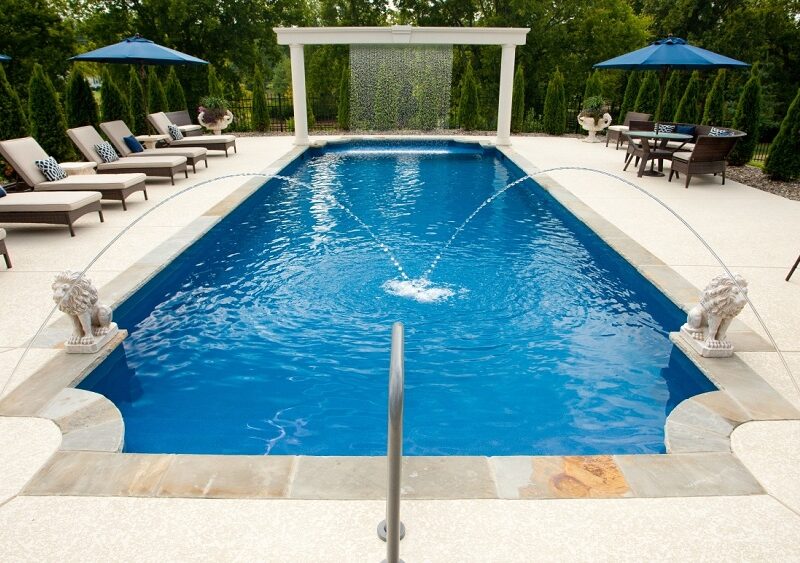Swimming pools may either use a salt water system or a chlorine system, and it’s important for you to understand the benefits and challenges of both chlorine and salt water, so that you can keep your pool in top condition. The older tradition, and what many people are familiar with, is
chlorine pools. Salt water pools have now emerged as a popular choice for families, as they can be of benefit for you and your swimming pool. Let us help you understand if a salt water pool is a good option for your fibreglass pool.
How does salt water sanitise the pool?
Using a salt chlorine generator, salt is added to the water in the pool and the generator of your pool will directly convert it into chlorine to sanitise the pool. The salt added is at a level high enough to allow the functioning of the generator. Usually a salt chlorinator’s range can range between 3,000 and 4,000 parts per million. However you don’t have to worry about tasting a lot of salt even if the water from your swimming pool enters your mouth. Plus, these kinds of pools have salinity levels that are only 1/10th of the ocean’s salinity level. So it’s not going to be as salty as the sea, in fact, you would only taste as much salt as you would in a teardrop.
Salt water is the more preferred choice for fibreglass pools:
Salt water can help keep your fibreglass pool a lot cleaner, and you may even have a silky feel when you’re in the pool. It is estimated that about 80% of families in Australia utilise a salt water system in their swimming pool. More and more homes are shifting to make use of salt water systems, as they also don’t have to experience the smell or the eye-burning that is so common when a chlorine pool is used. Many families report they like salt water in their fibreglass pools because they feel cleaner. Not to mention, they don’t have that chlorine smell and taste that most other pools do. A challenge to keep in mind is to look at the area around your fibreglass pool. There may be concrete, equipment, or a timber deck around your pool. These will be subjected to splashing from the pool. Whilst the surfaces will dry over time, the concentration of the salt is high and can corrode objects which have aluminium or metal fittings. You can use fresh water to wash down these surfaces after you use the pool, to prevent this from occurring. Also ensure that the handrails/ guards that you install are compatible with the salt water system you’re using.
Benefits of salt water:
- Salt water systems can add to the many benefits of the popular fibreglass pools, and make it easier for you and your family to head out for a swim in your backyard.
- They’re safer, because the chlorine levels released by the salt chlorine generators are much lower than the concentration in chlorine pools. This means they are safer to use without worrying about the hazards from exposure and contact to such harsh chemicals. Unlike in chlorine, you can keep your eyes open underwater without having to worry about damage or have any pain caused to your eyes.
- An unhygienic pool is a major health concern, but with the regular disinfection which occurs with the salt chlorine generators, you won’t have to worry about the safety of your family and friends when they go for a swim. Basically, the process of electrolysis in the saltwater system releases hypochlorous acid, and when salt dissolves in water it helps maintain a clean pool.
- Salt water also has the ability to exfoliate, rejuvenate, and even detoxify and cleanse the skin. It increases the ability of the skin to lock in moisture, helping to nourish your skin and giving it a smooth feel, plus you won’t be left smelling like chlorine!
- With salt water in your fibreglass pools, you will not have to be concerned about coming out of the pool smelling strongly like chlorine. Salt water pools are gentle on the body due to their low levels of chlorine concentration.
- People with allergies or sensitive skin can use the pool without the risk of getting itchy or dry skin. You may actually find a lot of relief through the use of salt water in fibreglass pools.
Did you know that because the fibreglass pools newcastle are so smooth and non-porous, they require less maintenance and cleaning? Fibreglass also doesn’t attract bacteria and algae in the same way that other pools do. You can enjoy a bacteria-free fibreglass pool with the benefits of using a salt water system! Its smooth surface ensures that you experience minimal collection of bacteria and algae. Vinyl liner pools have metal parts, as well as connections, which will corrode with salt water being used. Saltwater can harm the inside of concrete pools, especially those with plaster. This means that by choosing salt water, you’ll be saving on maintenance costs and time spent cleaning, without having to worry about any risk of corrosion of the pool surface.
It’s important to check with a professional when making the decision about buying a salt water system for your fibreglass pool. You will need to know everything about the running and maintenance, so you can ensure it functions efficiently. Making sure your salt water fibreglass pool is well maintained and performing regular checks is crucial if you want to prolong the life of your pool and minimise any repair costs. Please reach out to the team at The Fibreglass Pool Company, as we would be happy to help with any questions you might have around salt water systems for your fibreglass pool.










